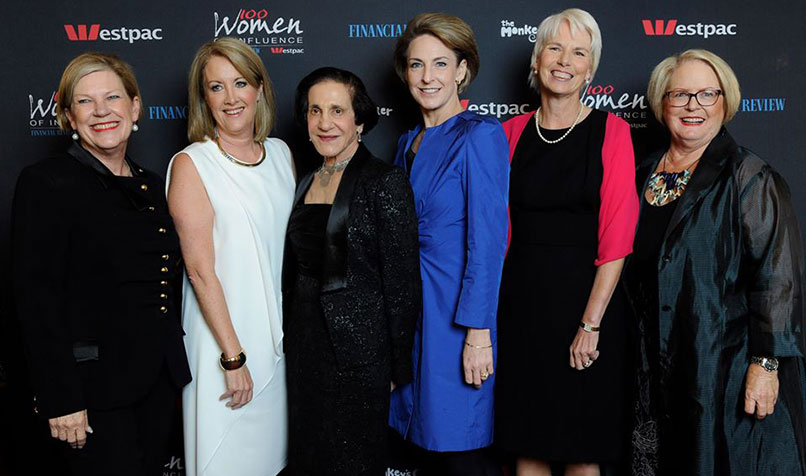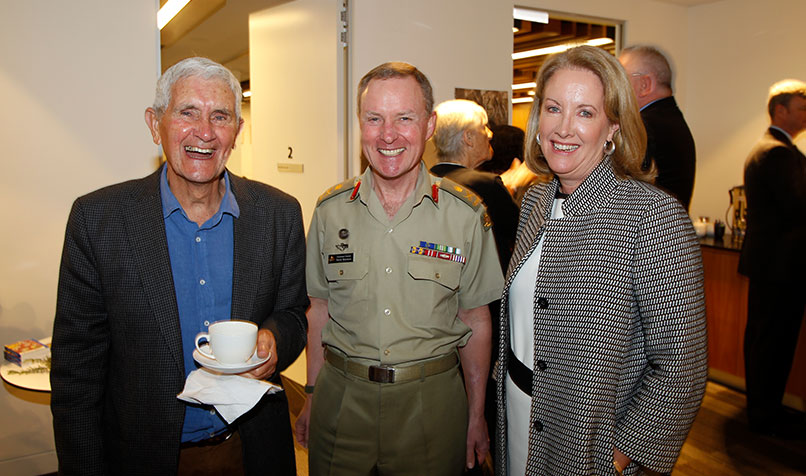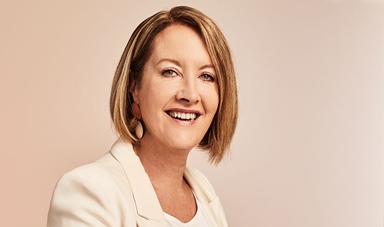Loading component...
At a glance
- Elizabeth Broderick AO is the founder of Male Champions of Change, which is committed to changing gender imbalance in workplaces worldwide.
- Broderick is Australia’s longest-serving Sex Discrimination Commissioner, known for her strong empathy and dedication.
- She is also one of the UN’s Special Rapporteurs for Discrimination against Women and Girls and a member of its Working Group.
It wasn’t until Elizabeth Broderick returned to work as a lawyer after the birth of her son 23 years ago that she realised the playing field for men and women at work was certainly not even – and she couldn’t accept that.
Despite growing up in a highly feminised household in suburban Sydney – as one of three girls where domestic work was divided equally between her parents – Broderick coins her awakening as “late onset feminism”.
“I realised that I didn’t want to have a baby and race back to work in exactly the same way that I had worked before,” she says. “That was what led me on the journey of flexible work.”
This experience of flexible work was “introduced by stealth”. Along with a group of new mothers returning to work, she transformed litigation rooms at her law firm into makeshift day-care centres and developed rosters to cover the work.“We figured we’d ask for forgiveness rather than permission,” she says.
It worked. Broderick went on to become the first part-time partner at the firm (Ashurst Australia – then called Blake Dawson Waldron), and by the time she left in 2007, 10 per cent of the partners were part-time and 20 per cent of employees had adopted flexible work arrangements.
Getting started
Broderick’s choice to study law was the result of a coin toss with her twin sister, Dr Jane Latimer.
We both wanted to do law and we both wanted to do physiotherapy,” Broderick says. “I think, in the end, we just flipped a coin – it’s probably as unscientific as that.”
Broderick has made the most of that fateful toss. In 2016, she was awarded the Order of Australia for her advocacy with respect to human rights and family violence. She was Telstra’s NSW Business Woman of the Year in 2001, Australia’s longest-serving Sex Discrimination Commissioner (2007- 2015), and is an Independent Expert and UN Special Rapporteur for Discrimination against Women and Girls.
She also founded the unique gender inequality-busting group Male Champions of Change in 2010, which aims to harness male individual and collective leadership to elevate gender equality as an issue of national and international social and economic importance.
Broderick has attracted an army of supporters across the globe, and has a knack for getting people on side, even if they don’t always agree with her position.
“Liz doesn’t seek attention,” says Male Champion of Change Andrew Colvin, the former Australian Federal Police commissioner, who now heads the National Bushfire Recovery Agency.
“I can only imagine the slings and arrows that are thrown at her for taking such a prominent position and role on a topic that, wrongly, still divides society.”
Working with men
The Male Champions of Change is a unique model. What started as a group of six “powerful, decent men” who Broderick knew had some commitment to gender equality, has grown into a global movement of over 250 men and women fighting to change gender imbalance in workplaces.
There are 15 Male Champions of Change groups in Australia, representing industries such as property, sport, insurance, architecture, fire and emergency services, consulting, health and the New South Wales government. There are also two international groups – one for global tech and one in Pakistan.
Broderick explains that Male Champions of Change is a strategy directed at CEOs who recognise that strong leadership is critical to creating change.
"We started to see that no one of us acting independently will ever be as effective as all of us acting together."
“We started to see that no one of us acting independently will ever be as effective as all of us acting together,” she says. “We said, ‘we have an immense collective power, so let’s use that to open up space for women and really promote gender equality’.”
When Broderick established the first group a decade ago, one of the first commitments members made was the Panel Pledge – where participants decline to be involved in any panel or conference that does not have a good representation of women.
Fast-forward to 2020 and Tony Hall, director-general of the BBC and a member of the Male Champions of Change Global Tech Group, recently took the sentiment of that Panel Pledge through all programming at the BBC, aiming to increase the number of women on TV and radio. Gender equality will soon be live on the BBC – and there is no changing the channel.
Changing minds and hearts

Carol Schwartz, director of the Trawalla Group, board member of the Reserve Bank of Australia and the convenor of the Male Champions of Change Property Group, says she was not without scepticism when she first heard about Broderick’s gender equality initiative.
“When she first told me about the Male Champions of Change, I said to her, ‘Oh, come on Liz, that’s just not going to happen. You are setting yourself a really difficult task’,” Schwartz says.
“I was eating my words within about 12 months, because what she was able to achieve with very, very senior leaders was quite remarkable. They were talking about things I don’t think they’d ever even thought about, let alone advocated for.”
Colvin agrees it is difficult to resist Broderick’s approach.
“Liz is collegiate, she’s collaborative, and she keeps her eyes focused on what we’re trying to achieve. I’ve never once seen Liz have to be forceful with people,” Colvin says.
“I often watch her and marvel at the fact that she can do this with such influential people around the room. If you put these CEOs around a boardroom table in any other circumstance, there’d probably be disagreement all over the place, but she unifies us.”
Indeed, Male Champions of Change isn’t without its detractors. It has been criticised as a window-dressing initiative and one that gives credit to men for addressing the gender gap.
“I think it was really controversial when it started,” Broderick says. “There are still women’s rights activists who oppose the strategy and think this is about reinforcing the patriarchy.
“I think for most women who care about women’s rights and gender equality today, they realise that this is not a women’s issue. It is a key economic and social issue.”
The 2019 Impact Report by Male Champions of Change goes some way in negating this criticism, with evidence showing the progress that has been made to date.
Of the organisations involved with the group, 89.2 per cent have flexible access to parental leave, 85.1 per cent have a specific gender equality action plan, and 77 per cent are conducting and acting on pay equity audits at least every two years.
“The fact that the gender pay gap persists over half a century since the first equal pay legislation is unacceptable,” she says. “If we are to deliver equal pay, leaders must collect the data, measure the pay gap and take action. It’s not a one-off fix, but rather requires constant vigilance.”
On sexual harassment, Broderick says more needs to be done by leaders, and that it is still pervasive in every workplace.
“If you are not hearing about it, that’s a red flag. It is everywhere, and it is important as a leader to be going out actively and intentionally looking for it,” she adds.
Broderick has spoken publicly about her own experience with sexual harassment by a client of her law firm. Without any formal policy in place for dealing with it, Broderick relied on her colleagues to help stop the harassment by telling him she was not available every time he rang.
“Would I make a formal complaint now? I would hope it would be easier now, but we didn’t even have a formal process at that time,” Broderick says, adding that, as her harasser was a client of the firm, there was no protection under the Sexual Discrimination Act at the time.
“We drank champagne the day we got the Act changed when I was the Sex Discrimination Commissioner to include harassment from customers and clients,” she says.
Taking it to a national level
Broderick’s work with of Male Champions of Change was forged during her term as Federal Sex Discrimination Commissioner from 2007-2015.
Australian Human Rights Commission CEO, Padma Raman, has known Broderick for years, first working with her on a legal and technology project during Broderick’s legal career.
“She was one of those few lawyers who was working on law and technology pretty early on,” Raman says, “and definitely one of the few women who were in that space.
“When she worked as the Sex Discrimination Commissioner, one of the really important things that came up in her term was the sexual harassment scandal that happened in the Australian Defence Force in 2011.”
At the request of the Minister for Defence, Broderick delivered the ground-breaking Review into the Treatment of Women in the Australian Defence Force, during which she had one-on-one meetings with women who had suffered abuse or harassment from senior Defence officials.
Raman says that, as Australian Human Rights Commission CEO, she “had trepidations” about these meetings, but that Broderick “turned out to be right”.
“She’s got such strong empathy that it worked bringing victims and senior officials together,” Raman says.
Broderick’s human-touch approach in her role as Sex Discrimination Commissioner also saw her travelling the country addressing a range of issues, such as developing a national paid parental leave scheme and advocating for domestic violence reform.
“I didn’t want to just be a blow-in bureaucrat and come in and say, ‘Oh, that was sad – but I’ve got the next thing to go on to’,” Broderick says. “I wanted to step up and support the community.”
This community extends to the far corners of Australia. In 2009, she led a group of Aboriginal women from Fitzroy Crossing, Western Australia, to the UN to tell their story. The women were battling the chronic effects of Fetal Alcohol Spectrum Disorder in their community. Working with her sister Dr Latimer, a professor in the School of Public Health at Sydney University, and filmmaker Melanie Hogan, Broderick encouraged the women to tell their story in the film Yajilarra, which was screened at the UN.
“It was one of the most inspiring moments of my professional life,” Broderick says. “The Aboriginal women were like rock stars in the UN, because I don’t think they had been included on a delegation before.
“I still remember how June Oscar [now the Aboriginal and Torres Strait Islander Social Justice Commissioner] spoke in her own language and she said, ‘This is the first time that the people of the world will have heard the language of my people’.”
Going global

Broderick is continuing that frontline work in her term as one of the UN’s Special Rapporteurs for Discrimination against Women and Girls and a member of its working group.
Two years into her six-year term, she says her work is far from over.
“What we are seeing globally at the moment is a major backlash and regression on women’s rights,” she warns. “Gender studies are being slashed from universities in Eastern Europe and, in the US, something like 60 pieces of legislation have been passed restricting women’s access to sexual health and reproductive rights.”
This work is certainly not without its challenges, but Broderick is optimistic for the future and, according to her colleagues, there is no doubt she will achieve what she has set out to do.
“After people interact with her for a short amount of time, they come to realise how tenacious, focused and outcome-oriented she is, and that when she sets herself a goal or an objective, no matter how impossible it may seem, she actually gets it done,” Schwartz says.
That’s promising news for the future of gender equality.
Male Champions of Change
The Male Champions of Change (MCC) Institute activates peer groups of influential male leaders, supports them to step up beside women, and drives the adoption of actions across the public and private sectors.
Since its inception in 2010 with eight Australian leaders, the founding MCC Group has grown to include 30 CEOs, board directors, government entities, university and military leaders.
The MCC coalition now encompasses 15 groups across specific industries, adding up to more than 230 leaders across Australia.
Each group has a convenor and program directors who implement the strategy and actions in individual organisations. Actions include:
- Meet at least four times a year as a group. No proxy delegates are accepted.
- Agree on a shared purpose and clear priorities, and publicly commit to using individual and collective leadership and resources to advance gender equality.
- Establish a support team in each organisation to ensure the delivery of individual and shared commitments.
- Share experiences, data and reflections on leadership.
- Listen widely and develop personal insights into the issues and opportunities for improvement.
- Work to identify and implement progressive, high-impact actions that disrupt the status quo and create meaningful and lasting change.
- Lead with action and advocacy, working within and across organisations and collectively at a community level.
- Be accountable and share experiences.
Career timeline
Broderick is a former partner and head of legal technology at Ashurst Australia (formerly Blake Dawson Waldron), a global commercial law firm. When she left in 2007, 10 per cent of the partners were part-time and 20 per cent of employees had adopted flexible work arrangements.
2001: Named Telstra NSW Business Woman of the Year.
2007-2015: Appointed Sex Discrimination Commissioner.
2010: Established the Male Champions of Change program.
2016: Appointed an Officer of the Order of Australia. New South Wales Australian of the Year.
2017: Appointed UN Independent Expert (Special Rapporteur) for the Working Group on Discrimination against Women and Girls.
2018: Launched the Male Champions of Change initiative globally.

